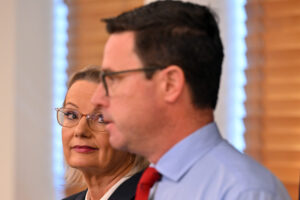If the Coalition’s aim is to stay in opposition, it’s doing a bang-up job.
Not content with alienating voters in former blue-ribbon seats who think climate change is real by dithering on its net-zero commitment, several male Coalition MPs did their level best this week to alienate women as well.
Here’s what happened. “Priya’s Law” was an uncontroversial bill designed to clarify that employers can’t just cancel paid parental leave if a child is stillborn or dies after birth. The law was drafted after baby Priya died when she was just 42 days old and a heartless employer notified Priya’s mother, just days after her daughter’s death, that her pre-approved parental leave was being cancelled and she was required to return to work.
It is every parent’s worst nightmare. But for Barnaby Joyce, Andrew Hastie, and several other male Coalition MPs you’ve never heard of, it was also an opportunity to virtue-signal on abortion.
“Unfortunately – I hate to bring it up – there remains the issue of late-term abortion. We have a right to know if it includes that,” Joyce said.
Hastie reminded the Parliament he was opposed to late-term abortion, saying “I do have a question about the unintended consequences of this bill and it applies to late-term abortions.”
The clear implication was that women might seek late-term abortions in order to access paid parental leave they don’t deserve. The president of the Royal Australian and New Zealand College of Obstetricians and Gynaecologists (RANZCOG), told Guardian Australia the comments were “terrible, cynical, awful”. The reality is that overwhelming majority of women who seek abortions at later stages of pregnancy do so for urgent medical reasons, like fetal abnormalities or where continuing the pregnancy puts the mother’s life is at risk, and the pregnancy is very much wanted.
Senior women in the Coalition were also horrified. Opposition leader Sussan Ley described their interventions as “insensitive'” while Jane Hume rather politely called it an “error of judgement” on Sky News.
It’s the last thing Sussan Ley needs as she fights to retain the leadership and win back the voters the Coalition lost at the last two elections. But it’s not the first time the far right of Australian politics has attempted to import US culture wars here.
In South Australia, Liberal MP Ben Hood introduced amendments designed to force women to be induced after 27 weeks and six days instead of getting abortions, and Queensland has seen similar attempts to restrict access to abortion. A majority of Australian support access to abortion, despite the fact abortion sat within the criminal code in most states until very recently.
The culture wars of the far-right lead in the United States have been extremely successful at winding back abortion rights. After the Trump-stacked Supreme Court overturned Roe versus Wade, a host of states enacted draconian anti-abortion laws.
Obstetricians and gynecologists are fleeing states with abortion bans fearing prosecution, leaving pregnant women without access to adequate medical care. Women are being criminally charged for having miscarriages, or for disposing of the remains of their miscarriage in ways police or healthcare professionals don’t like.
More than 200 people have been arrested over pregnancy-related criminal charges, according to Pregnancy Justice. Police are using licence plate reading technology as surveillance to track women across state lines and prosecute them for seeking abortions. And it looks like the Trump administration is coming for birth control next, with reports that it plans to redefine common kinds of contraception like IUDs, hormonal implants and the pill as “abortifacients”. America has become very Handmaid’s Tale very quickly.
The United States under Donald Trump is increasingly unrecognisable to Australians. Australia Institute research shows around half (48 per cent) of people in Australia feel less secure since the election of Donald Trump as President of the United States. Australian Defence Minister Richard Marles recently said Australia and the United States “share values” of “democracy and the rule of law”, but far more Australians disagree we share values than agree.
If Australia were to follow the United States down this road, women will die, as they have in the United States.
Priya’s Law was and is about stillbirth and infant death, which affects far too many Australian families. It easily passed the Parliament. But let’s be clear about one thing: abortion is medical care. Medical studies show having a termination is less risky for women than pregnancy and having access to safe abortion services is a matter of life and death. Whether a woman simply wishes to end an unwanted pregnancy, or because they desperately want a child but encounter life-threatening complications for the mother or the fetus during pregnancy – abortion is medical care. Restricting access to safe, legal abortion kills women.
The anti-abortion movement seeks to treat a fetus like a person and woman like a mere incubator. The way the far-right weaponises abortion makes it clear they care nothing for the safety or rights of women, their objectives are only about controlling and punishing women. This attitude was clearly on display in the way these male MPs hijacked a universally supported bill about stillbirth to score political points on abortion.
The decision to terminate a pregnancy is one that a woman makes for herself, in consultation with her doctor, not in consultation with her local member of Parliament.
The Coalition is in a hole right now with its primary vote at a record low. Women and voters in the cities have been abandoning the Coalition, and the Liberals in particular, in droves. The Nationals’ decision to dump net zero will only reinforce voters’ assessment that the Coalition is dominated by climate sceptics. While the decision of these male Coalition MPs to weaponise abortion in the Parliament will only further alienate women voters. These Coalition blokes appear to have forgotten the first rule of holes: when you’re in one, stop digging.
Between the Lines Newsletter
The biggest stories and the best analysis from the team at the Australia Institute, delivered to your inbox every fortnight.
You might also like
Gender parity closer after federal election but “sufficiently assertive” Liberal women are still outnumbered two to one
Now that the dust has settled on the 2025 federal election, what does it mean for the representation of women in Australian parliaments? In short, there has been a significant improvement at the national level. When we last wrote on this topic, the Australian Senate was majority female but only 40% of House of Representatives
The election exposed weaknesses in Australian democracy – but the next parliament can fix them
Australia has some very strong democratic institutions – like an independent electoral commission, Saturday voting, full preferential voting and compulsory voting. These ensure that elections are free from corruption; that electorate boundaries are not based on partisan bias; and that most Australians turn out to vote. They are evidence of Australia’s proud history as an
Full preferential voting means you can’t waste your vote
Full preferential voting is a proud Coalition reform – one that benefits every political persuasion Compulsory voting and full preferential voting make up the backbone of Australian democracy, and protect us from voter suppression and disengagement seen in other countries. We owe both to the parties of the centre-right, what would become the Liberal–National Coalition.


